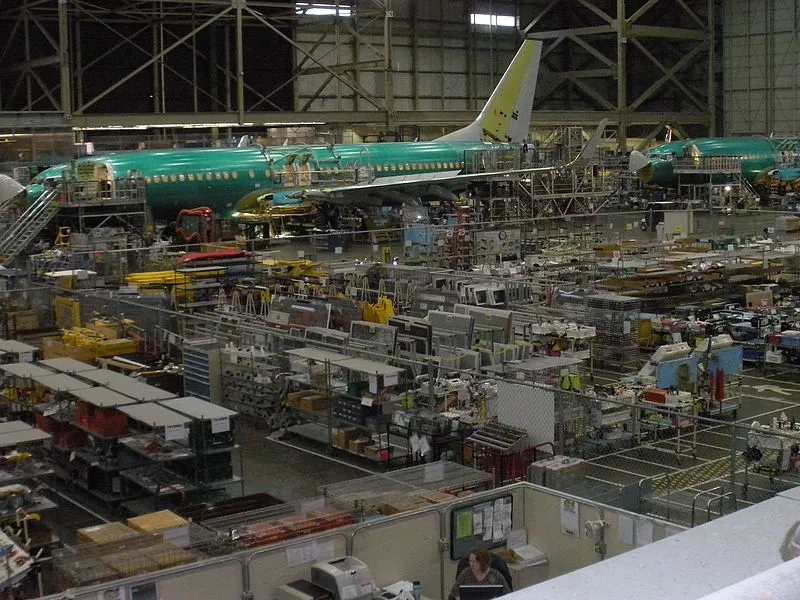
Boeing caught in US-China trade battle
Apr 04, 2018

Boeing finds itself entangled in the ongoing trade battle between the United States and China, facing a challenging landscape for its aircraft sales. As tensions rise over tariffs and trade policies, the company grapples with fluctuating demand from Chinese airlines, which are crucial to its growth strategy. Additionally, competition from Chinese manufacturers adds pressure, complicating Boeing's efforts to maintain its market share. The geopolitical landscape affects not only sales but also supply chains and partnerships, forcing Boeing to navigate a complex environment while seeking to sustain its position in the global aviation market.
The ongoing trade battle between the United States and China has put major corporations in a difficult position, and Boeing is no exception. As one of the largest aerospace manufacturers in the world, Boeing has significant exposure to the Chinese market. The dynamics of this trade dispute could greatly impact their business operations and future growth. Understanding the implications of this trade battle is crucial for stakeholders and industry analysts alike.
Boeing's Dependence on the Chinese Market
Boeing has long relied on China as a critical market for its commercial aircraft. In fact, Chinese airlines are projected to purchase over 7,000 new airplanes in the next two decades. This demand is driven by the rapid growth of the Chinese economy, urbanization, and an increasing middle class eager to travel. However, the "US-China trade battle" has strained these relationships, leading to uncertainty in future orders and deliveries.
Impact of Tariffs on Aircraft Sales
The imposition of tariffs on goods between the US and China has created a ripple effect throughout various industries, including aerospace. In retaliation to US tariffs, China has considered implementing tariffs on American-made aircraft, which could significantly affect Boeing's profit margins. The following table illustrates the potential impact of tariffs on Boeing's sales:
| Year | Projected Sales (without tariffs) | Projected Sales (with tariffs) |
|---|---|---|
| 2023 | $20 billion | $15 billion |
| 2024 | $22 billion | $16 billion |
| 2025 | $25 billion | $18 billion |
This table highlights that if tariffs are imposed, Boeing could see a significant reduction in projected sales, affecting their overall revenue and growth strategy.
Strategic Responses to the Trade Conflict
In response to the trade tensions, Boeing has adopted various strategies to mitigate risks associated with the "US-China trade battle". One of the key strategies has been to diversify its supply chain and reduce reliance on specific markets for both production and sales. By sourcing materials and components from various countries, Boeing aims to lessen the potential impact of tariffs and trade restrictions.
China's Domestic Aviation Industry Growth
Another factor complicating Boeing's position is the rapid growth of China's domestic aviation industry. Companies like COMAC are stepping up their efforts to compete in the commercial aircraft market, aiming to reduce China's dependence on foreign manufacturers like Boeing. The emergence of local competitors may further influence demand for Boeing aircraft in China.
Investor Sentiment and Stock Performance
The trade conflict has also affected investor sentiment towards Boeing. Fluctuations in stock prices can be attributed to news related to the "US-China trade battle" and its anticipated effects on Boeing's earnings. Investors are increasingly concerned about the company's ability to maintain profitability in the face of rising geopolitical tensions.
In recent months, Boeing's stock performance has shown volatility, as illustrated in the chart below:
| Month | Stock Price |
|---|---|
| January | $230 |
| February | $215 |
| March | $220 |
| April | $210 |
This chart indicates that Boeing's stock price has experienced fluctuations, reflecting the uncertainty surrounding the "US-China trade battle" and its potential consequences.
Future Outlook for Boeing
Looking ahead, the future of Boeing amidst the "US-China trade battle" appears uncertain. The company will need to navigate complex geopolitical landscapes, adapt to changing market conditions, and innovate to maintain its competitive edge. Building strong relationships with Chinese airlines and government entities will be essential for Boeing's long-term success in this crucial market.
Conclusion
In conclusion, Boeing is caught in the crosshairs of the "US-China trade battle", facing challenges that could significantly impact its operations and profitability. The company's dependence on the Chinese market, the potential implications of tariffs, and the rise of domestic competitors in China all contribute to a complicated business environment. As Boeing works to adapt and respond to these challenges, stakeholders must remain vigilant and informed about the evolving situation.
Related Articles

Explore Thailand: The Best Islands to Visit for Paradise, Adventure, and Relaxation

The Ultimate Guide to the Best Islands in Thailand for Your Next Getaway

Do babies need passports? How to get a passport for a newborn

How to get a U.S. passport fast: here’s how to expedite the process

What is Mobile Passport Control: 5 reasons why you should use it

SENTRI vs. Global Entry: A detailed guide

Do you need a passport to go to the Bahamas? Let’s find out

Do you need a passport to go to Mexico? A detailed guide

Do you need a passport to go to Canada? We got the answer

Do You Need a Passport for a Cruise: An Essential Travel Guide

Booster Seat Requirements: All the Rules to Follow in Your Rental Car

What Are the World’s Most Powerful Passports, and How Does Yours Rank?

How to Take a Passport Photo at Home: A Helpful Guide

You've got to have heart! Southwest's new livery

Your opinion: Should water be free on low cost carriers?

Young women bolder than guys as solo travellers
